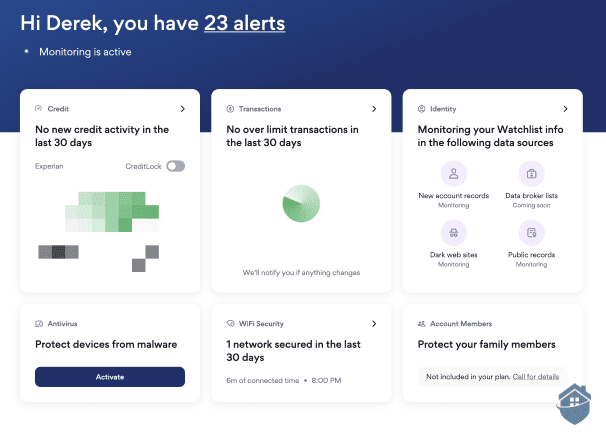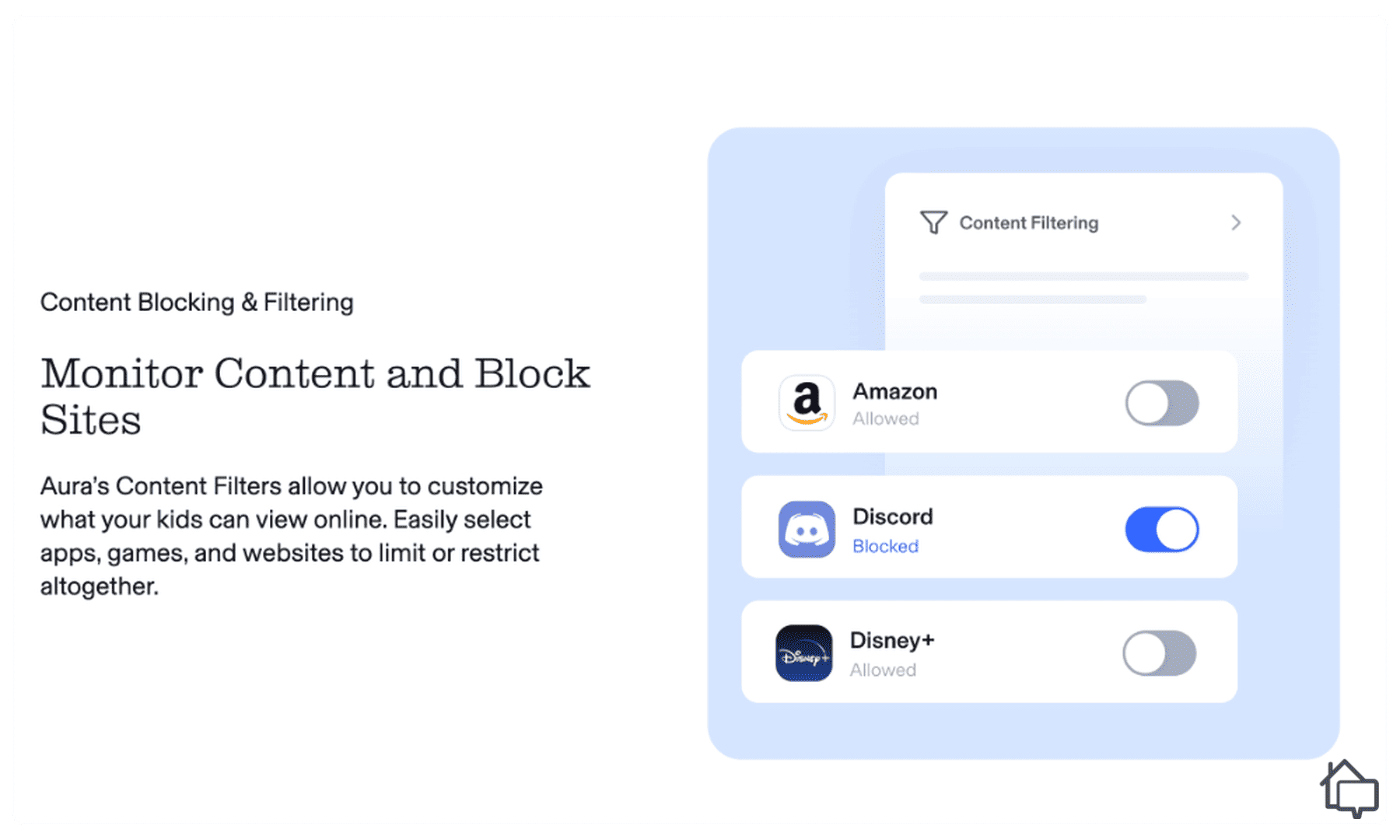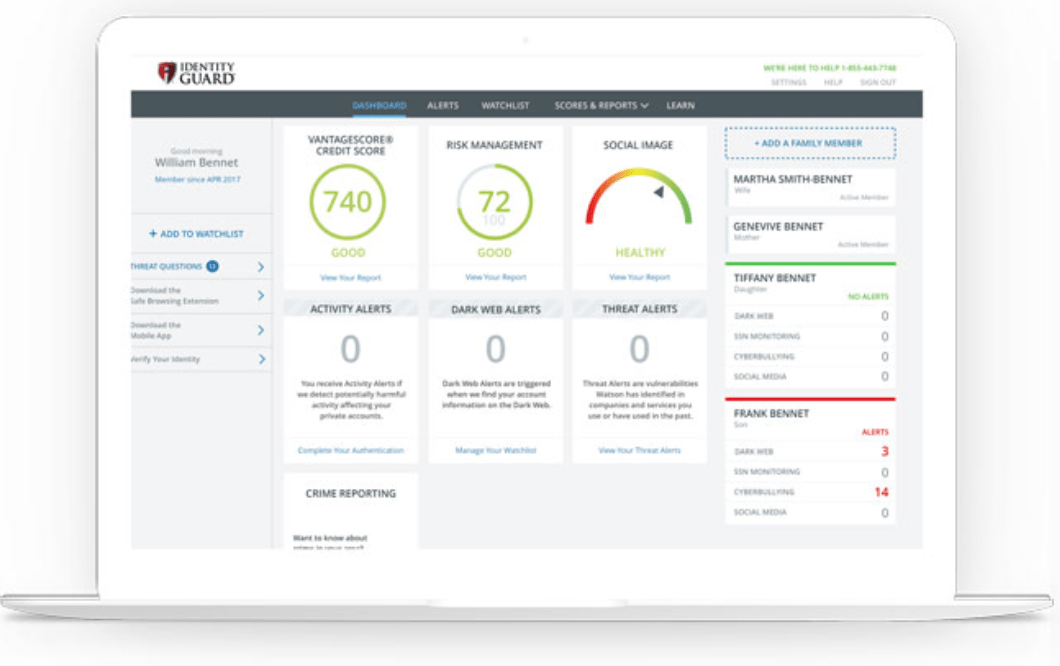Aura and IdentityForce are both great identity theft protection services. However, despite IdentityForce being a TransUnion brand, we found that Aura provides many of the same services at a cheaper overall cost. What’s more, it includes additional tools to protect your identity online.
Did You Know? IdentityForce isn’t the only identity theft protection agency owned by one of the three major credit bureaus. IdentityWorks is owned by Experian, and Equifax offers its own identity theft protection service. You can read our review of Equifax’s ID protection and our review of IdentityWorks to see what our hands-on experience with both of these services was like.
Here’s what we found when we personally tested out these two popular products.
Aura & IdentityForce Prices
Both services provide great value, but we like Aura more. It provides more convenient and extra features compared to IdentityForce. Plus, most of its subscriptions are cheaper.
Aura
Aura has a plan for everyone. Here’s a quick overview of Aura’s plans and pricing:
| Aura Subscription | Monthly Cost | Annual Cost |
|---|---|---|
| Kids | $13/month | $120/year ($10/month) |
| Individual | $15/month | $144/year ($12/month) |
| Couple | $29/month | $264/year ($22/month) |
| Family | $50/month | $384/year ($32/month) |
The Kids plan leans toward parental controls and online safety instead of protecting a child’s identity online. It includes features like screen time limits, internet usage reports, and in-game voice and text monitoring. The Individual, Couple, and Family subscriptions provide access to all of Aura’s identity theft protection features. The only difference is the number of adults covered by each subscription — Individual covers one adult, Couple covers two adults, and Family covers five adults and an unlimited number of kids.
Aura’s prices are affordable, but please keep in mind that they renew at a different year after one year (this doesn’t happen with IdentityForce). The renewal price is subject to the renewal rate at the time. We saw that the renewal prices become more expensive if you are on a monthly plan, so it’s best to opt for a yearly plan to get better savings.
We really like how Aura includes a 14-day free trial and a 60-day money-back guarantee on all of its annual plans for additional assurance.
>>Read More: Aura Identity Theft Protection Review
IdentityForce
The most important decision you’ll need to make when purchasing an IdentityForce product is whether you want to pay extra for credit monitoring. Here’s how much IdentityForce’s plans cost with and without credit monitoring:
| Plan | Monthly Cost | Annual Cost |
|---|---|---|
| UltraSecure Individual | $19.90 | $199.90 |
| UltraSecure+Credit Individual | $34.90 | $349.90 |
| UltraSecure Family | $24.90 | $249.90 |
| UltraSecure+Credit Family | $39.90 | $399.90 |
All of IdentityForce’s plans include dark web monitoring, identity theft insurance, and access to a restoration specialist who can create an action plan and resolve cases of fraud.
Pro Tip: IdentityForce has Individual and Family plans. The Family plan only covers two adults and up to 10 children. If you’re looking for identity theft protection for the entire family, Aura is a better pick since its Family subscription covers up to five adults and an unlimited number of kids.
But you’ll need to pay extra for TransUnion credit reports and three-bureau credit monitoring. For the additional costs, you’ll also get phishing and botnet monitoring along with quarterly three-bureau credit reports.
IdentityForce provides a 30-day free trial to help you choose the right option, but only for the UltraSecure subscriptions. Unfortunately, it doesn’t offer a money-back guarantee (like Aura does).
Aura & IdentityForce Feature Comparison
Aura and IdentityForce are both really feature-rich. In this section, we’ll cover their identity theft protection and credit monitoring features, as well as any extra security and child protection tools they offer.
Identity Protection
You get great identity theft protection features with both Aura and IdentityForce. Here’s a quick breakdown of what kinds of tools you get access to with both services:
| Identity Theft Feature | Aura | IdentityForce |
| Identity Theft Insurance | Yes (up to $1 million per user) | Yes (up to $2 million per user) |
| Identity Restoration | Yes | Yes |
| Dark Web Monitoring | Yes | Yes |
| Breach Notifications | Yes | Yes |
| Personal Information & SSN Monitoring | Yes | Yes |
| Home Title Monitoring | Yes | No |
| Criminal Records Monitoring | Yes | Yes |
The main difference is how both services handle identity theft insurance. We think Aura is better since it provides up to $1 million per subscription user. On the other hand, IdentityForce’s entire insurance amount is split between subscription users. For example, the UltraSecure subscription with the Family plan provides $1 million for two adults, so each user is covered by $500,000.
But other than that, Aura and IdentityForce are pretty tied. In addition to all of the features in the above table, you also get extras. This includes USPS address change monitoring (alerts you if your mail has been redirected through USPS) and lost wallet assistance.
Aura also comes with home title monitoring, which monitors your property tiles for signs of fraud, and alerts you if it detects any changes to existing titles. While IdentityForce lacks that, it provides access to social media identity monitoring (which Aura doesn’t have). This feature scans your social media accounts for potentially offensive posts, comments, and stories – suggesting violence, inappropriate content, discriminatory statements. Those could be signs that someone else is posting using your social media accounts, which could damage your reputation.
Credit Monitoring
You get in-depth credit monitoring and protection with both Aura and IdentityForce. Here’s a quick look at their main features:
| Credit Monitoring Feature | Aura | IdentityForce |
| Transaction Monitoring | Yes | Yes |
| Bank Account Monitoring | Yes | Yes |
| 3-Bureau Credit Monitoring | Yes | Yes (only on UltraSecure+Credit plan) |
| Monthly Credit Score | Yes | Yes (only on UltraSecure+Credit plan) |
| 401(k) & Investment Account Monitoring | Yes | Yes (only on UltraSecure+Credit plan) |
| Credit Lock | Yes | Yes (only on UltraSecure+Credit plan) |
We consider Aura more convenient because it provides access to these features on all of its subscriptions. With IdentityForce, you only get basic credit monitoring via its cheapest subscription.
But we want to note that IdentityForce sometimes outperforms Aura when it comes to alerts. For example, it sends you alerts about potential fraud (withdrawals, deposits, duplicate transactions) related to your brokerage and 401(k) accounts. Aura, on the other hand, only alerts you if your investment account information has been leaked on the dark web.
Additional Security Features
Aura and IdentityForce both provide access to additional tools that protect your data and devices. For example, both services come with an antivirus, which protects your device from malware infections, and blocks potentially malicious links and websites.
FYI: Aura’s antivirus works on Windows, Mac, and Android (IdentityForce’s antivirus is only on Windows). Aura’s antivirus also comes with a Safe Browsing browser extension for additional device protection. You can get similar digital protections with your identity theft protection through a NortonLifeLock plan. Check out our LifeLock review to learn more about this close competitor to Aura.
And you get access to a password manager with both Aura and IdentityForce. This is an app that allows you to securely store your passwords. In addition, it also makes it easy to generate strong logins.
You also get a virtual private network (VPN) with both services. This is an online app that secures your internet traffic, and prevents malicious actors from detecting your real-time location by hiding your IP address. Aura’s VPN is powered by Hotspot Shield (a popular VPN that Aura owns) — it’s very fast, really secure, and it works on desktop, mobile, and smart TV devices. IdentityForce provides its own VPN service, but it’s only available on mobile.
FYI: In addition to Hotspot Shield, Aura also owns Identity Guard, FigLeaf, PrivacyMate, and Intrusta. We’ve tested Identity Guard on its own as well, and although it doesn’t quite meet Aura’s standards, it gets close.
But Aura also has a few more additional security tools:
- Data removal. Aura contacts data brokers that collect your personal data and sell it to advertisers. It then requests the removal of your data from their databases.
- Email Alias. Protects you from potential spam and scams by allowing you to generate and use a fake email to sign up on websites.
- Spam call and message protection. Aura provides protection against phone scams and robocalls. You get free access to this feature via the Family subscription. On the other subscriptions, it’s available as a paid add-on.
Child Protection
Aura is much better for keeping your kids safe online compared to IdentityForce. With the Family subscription, you get access to online account and SSN monitoring for your kids, as well as credit freeze support. In addition, Aura alerts you about known or new sex offenders that are within a one mile radius of your address. IdentityForce also has sex offender monitoring, but it only alerts you if a sex offender moves into your neighborhood.
What’s more, Aura has 24/7 in-game voice chat and text monitoring for 200+ popular PC games — this helps protect your kids from cyberbullying and predators. Also, the service comes with parental controls too, which let you block inappropriate content and websites, limit and schedule device screen time, and pause internet access.
>>Read More: Keeping Kids Safe in the Digital Age
Comparing Aura & IdentityForce’s Privacy Policies
Given the volume of information we provided Aura and IdentityForce when signing up, we checked each company’s privacy policy first. We wanted to make sure they stored our data responsibly and minimized the spread of our data.
Aura’s Privacy Policy
The privacy policy for Aura is straightforward. We skipped straight to the section about how they use our data and whom they initially share it with. As many of the features come powered through third-party providers like Circle, some sensitive information is shared with them to help ensure effectiveness.
However, it also states Aura may provide your personal data to partners for offers. It doesn’t sell this information, however, and there are restrictions around how they can use these details to present promotions to you.
IdentityForce’s Privacy Policy
IdentityForce’s privacy policy is dicier. The first section that made us nervous referred to using our information for special offers or promotional and marketing materials (including sweepstakes and contests) on behalf of IdentityForce or third parties.
Did You Know? No federal consumer data protection law covers every piece of private information. Instead, there are several acts to protect specific data sets. Some examples are HIPAA, which protects medical records, and COPPA, which regulates the collection of sensitive data from children under 13.
Once you register for IdentityForce’s events, you agree to their rules. One includes using your name, voice, or likeness in marketing efforts. While Aura used our data for offers, it couldn’t use our details in marketing materials without additional consent.
There is also a section titled discussing how the company sells or shares personal data. Fortunately, it refers to transferring your personal data to credit reporting agencies in a way that may be considered a sale under specific state privacy laws and regulations.
Verdict: Aura or IdentityForce?
Both services are feature-rich and also provide access to extra security tools, like an antivirus, a password manager, and a VPN. But Aura’s security tools are better, and it also provides access to child protection features (making it a great pick for families). Not to mention most of Aura’s subscriptions are more affordable than IdentityForce’s plans.
IdentityForce might be a better pick if you want more in-depth financial monitoring alerts. Or if you’re only interested in securing your PC (IdentityForce’s antivirus service only runs on Windows).
Overall, no matter which Aura plan you choose, you’ll get everything you need to protect your identity online. That’s why it's our preferred choice.
FAQs
- Is IdentityForce legitimate?
IdentityForce is a product of TransUnion, one of the three major credit bureaus in the country. So you can trust it.
- Can Aura see text messages?
As of this writing, Aura can not monitor text messages. It can record the usage of messaging apps like Messenger or WhatsApp but can’t see the content within them.
- How long has IdentityForce been in business?
Founded in 2005, IdentityForce was first acquired in 2018 by a subsidiary of EZShield. The parent company rebranded in 2019 under the name Sontiq Inc. It then became a TransUnion company.
- Does Aura reimburse stolen money?
Every Aura policy comes with a $1 million insurance policy per adult and up to a maximum of $5 million on the Family plan. These funds can be used to cover fees and losses from identity theft.
- Is Cyberscout the same as IdentityForce?
Cyberscout was a different product but was acquired by Sontiq Inc in 2021. However, it’s no longer available for sale.










